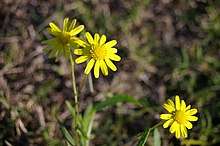Senecio madagascariensis
Senecio madagascariensis, also known as Madagascar ragwort[3], is a species of the genus Senecio and family Asteraceae that is native to Southern Africa. Other common names include Madagascar groundsel and fireweed.[3] It has been included on the noxious weeds list for Hawaii[4] and the reject list for Australia.[5] S.madagascariensis is the diploid cytotype of S.inaequidens.[6]
| Senecio madagascariensis | |
|---|---|
.jpg) | |
| Madagascar ragwort | |
| Scientific classification | |
| Kingdom: | Plantae |
| Clade: | Tracheophytes |
| Clade: | Angiosperms |
| Clade: | Eudicots |
| Clade: | Asterids |
| Order: | Asterales |
| Family: | Asteraceae |
| Genus: | Senecio |
| Species: | S. madagascariensis |
| Binomial name | |
| Senecio madagascariensis Poir. (1817) | |
| Synonyms | |
|
Senecio burchellii auct. - non DC. | |
Description

.jpg)
It is an erect, glaborous herb that grows up to 20-60cm in length. It may become woody and shrub-like in appropriate conditions. Leaves are alternate, narrow-lanceolate to elliptic in shape, usually bright green, smooth with margins that are lobed, serrate or entire. The broader, larger leaves are stem clenching and fleshy, 2-7cm long and 3-10mm wide.[7]
The flowerhead, which is part of an unfirm corymb, is made up of disc florets and ray florets, and is small, yellow and daisy-like, from 1-2cm in diameter. The plant flowers between late autumn and early spring in its native area. The fruit is an achene that is 1.5-2.5mm long and is brown-coloured, with a pappus that is 4-6.5mm long.[8]
Habitat
It is found in pastures, open woodlands, grasslands, suburban bushland, roadsides, disturbed sites, wastelands, parks and coastal environments in subtropical and warmer temperate regions.[9]
Toxicity
Senecio madagascariensis contains pyrrolizidine alkaloids and is poisonous.[10] Horses, cattle, and other livestock are at risk.
Symptoms of poisoning from fireweed include gradual weight loss, jaundice, fluid in the lungs, blindness, sudden death without any other indications, aimless wandering, muscular coordination, twitching of the head muscles, abdominal straining, rectal prolapse, and irritability.[4]
Distribution
- Native
- Afrotropic:
- Southern Africa: South Africa, eSwatini, and Lesotho, Madagascar, Botswana
Sources: GRIN[11]
References
- "Senecio madagascariensis". International Plant Names Index (IPNI). Royal Botanic Gardens, Kew. Retrieved 2008-05-27.
- "Senecio madagascariensis Poir. record n° 98241". African Plants Database. South African National Biodiversity Institute, the Conservatoire et Jardin botaniques de la Ville de Genève and Tela Botanica. Retrieved 2008-05-27.
- "Senecio madagascariensis". Natural Resources Conservation Service PLANTS Database. USDA. Retrieved 10 November 2015.
- Pacific Island Ecosystems at Risk (1999-01-01). "Senecio madagascariensis". Retrieved 2008-05-27.
- Pacific Island Ecosystems at Risk (2001-01-25). "Senecio madagascariensis". Retrieved 2008-05-27.
- LÓPEZ, MARIANA G.; WULFF, ARTURO F.; POGGIO, LIDIA; XIFREDA, CECILIA C. (December 2008). "South African fireweed (Asteraceae) in Argentina: relevance of chromosome studies to its systematics". Botanical Journal of the Linnean Society. 158 (4): 613–620. doi:10.1111/j.1095-8339.2008.00865.x.
- Senecio madagascariensis Poiret International Environmental Weed Foundation (IEWF)
- Auld BA, Meld RW (1992) 'Weeds an illustrated botanical guide to the weeds of Australia.' (Inkata Press: Melbourne)
- Senecio madagascariensis Poir. Weeds of Australia, Biosecurity Queensland Edition
- The MERCK Veterinary Manual, Table 5 Archived 2010-11-17 at the Wayback Machine
- "Senecio madagascariensis". Germplasm Resources Information Network (GRIN). Agricultural Research Service (ARS), United States Department of Agriculture (USDA). Retrieved 2008-05-27.
- Canadian Food Inspection Agency
External links
![]()
- "Senecio madagascariensis". Integrated Taxonomic Information System. Retrieved 27 May 2008.